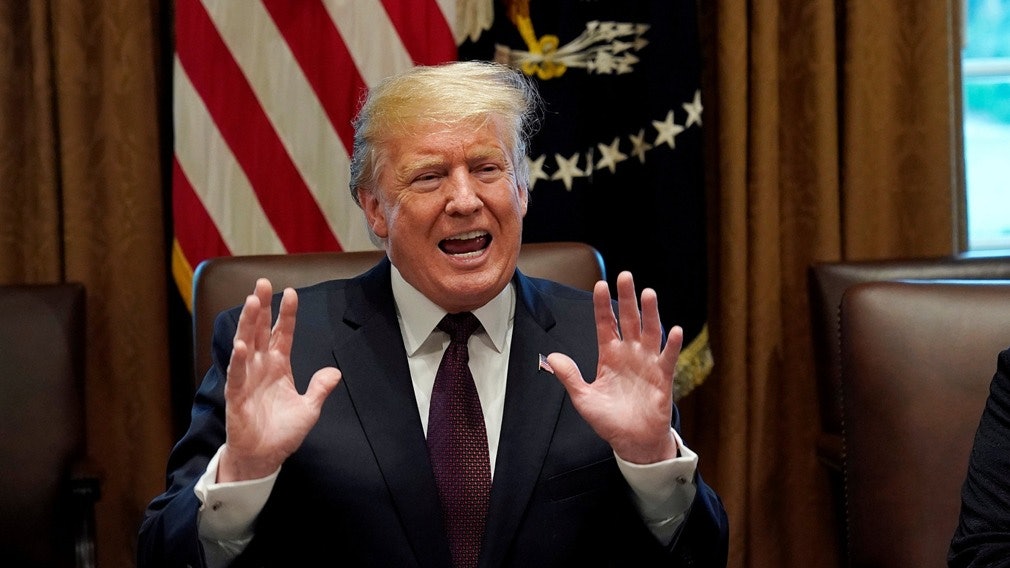At the end of June, the Group of 20 (G20) “Study Conference” restarted China-US trade negotiations. US President Donald Trump also said that he would not impose more tariffs on China. However, on July 16, Trump’s tone changed dramatically. One of the important reasons was that China did not purchase large quantities of US agricultural products.
Trump re-raises new tariffs
US President Trump said at a cabinet meeting on July 16 that what China is doing is not appropriate. They should have purchased American agricultural products. “Will they buy our produce, we will wait and see.”
Trump also threatened that the United States still has a long way to go in terms of tariffs on China. “If we want to, we can also tax another $325 billion in goods.”
Less than 20 days ago, Trump also said at a press conference that the United States would not impose new tariffs on China. On June 29, after the “Study Conference” in Osaka, Japan, Trump said at a personal press conference that the United States will not impose new tariffs on China, but will not cancel the tariffs already imposed. Trump also said that he will relax restrictions on the procurement of US technology by Huawei Technologies Co., Ltd., allowing US companies to export parts of Huawei that do not pose a safety risk. At the same time, Trump also said: “China will buy a lot of food and agricultural products, they will start soon, almost immediately will start buying.”
The farmers gave Trump great support in the 2016 general election, and the biggest blow in the trade war was the American farmers. According to data from the US Department of Agriculture, China has been an important buyer of US agricultural products for many years, but due to the trade war, agricultural products exported to China in 2018 have fallen sharply. On the eve of the 2020 election, Trump will definitely want to stabilize the rear.
China is not buying US agricultural products
It is clear that Trump expects to stop levying new tariffs and relaxing sanctions against Huawei in exchange for China’s massive purchase of US agricultural products. Before the “Study Conference,” the United States had been threatening to tax another $300 billion in Chinese goods.
However, the Chinese side has been inactive and has not purchased large quantities of US agricultural products. This has made the Trump administration very dissatisfied. Trump himself and his senior officials have all expressed their pressure to pressure China.
Larry Kudlow, chief economic adviser to the White House, said in an interview with Fox on July 15 that the US government is still waiting for Beijing to respond to US goodwill. For example, the United States has relaxed its ban on Huawei and ordered any new tariffs. . He said: “We expect China to purchase a large amount of US agricultural products, goods and services. We have not seen this yet, but we are very close to paying attention to this progress. I hope they will honor their promises.”
Kudlow also said in an interview with CNBC on the 9th: “We hope that President Xi will be able to take immediate and prompt action on agricultural procurement during the negotiations. “This is very, very important.”
Trump himself also said on Twitter on July 11: “China has let us down. They said that they will buy Chinese agricultural products but they have not acted. I hope they will start soon!” He also said on the 15th that he The relationship with Chinese President Xi Jinping is not as good as it used to be.
However, according to Western media such as The New York Times and The Wall Street Journal, Xi Jinping did not make such a commitment during his meeting with Trump. Trump mentioned the issue of buying agricultural products twice during the meeting, but Xi Jinping only agreed to buy American agricultural products under the framework of signing a wide-ranging final agreement.
In addition, Beijing continues to pressure the United States to lift tariffs on China’s $250 billion in goods, while allowing China to more gradually change intellectual property laws and other regulations.
For reports on these media, White House trade consultant Peter Navarro said in an interview with CNBC on July 12 that some reports in The Wall Street Journal were rubbish. He also called on investors to be patient with the negotiation process and not to believe in media coverage unless the content is from US President Trump or trade representative Robert Lighthizer.












